Zero G Read online
Page 2
Zero’s father floated toward the signs and tapped the one that said “Rings 1–89.” “That’s the back of the ship. It’s called the aft,” said Zero’s father. “The front of the ship is called the fore. The Rings are basically like the floors of a building, so you can think of this as a skyscraper with three hundred floors.”
“Our pods are in Ring 181,” said Yen, taking charge and pointing toward the fore. “This way.”
Their mother looked confused. “And we just . . . float through the center of the ship?”
“Yep,” said their father. “The outer edge of the ship is all stasis pods, and then there’s an inner Ring of cargo, and then this central column is how you get around. We could go through the outer tunnels, technically, but the open center is faster.” He turned himself sideways so that his head was pointing to the fore and jumped. He sailed toward the nearest metal struts, grabbed them, and turned back to look at the rest of the family. “Come on! It’s fun!”
Park grinned and jumped after him. Zero turned himself the same way, ready to jump as well, but Yen pushed him hard on the arm and he flew sideways instead, bumping into a metal wall with a thud. It didn’t hurt, but Zero snarled and launched himself after Yen, ready to tackle him. The trouble was, he aimed himself at where Yen started, not where Yen was going, and he couldn’t change direction in midair. While the rest of the family flew gently toward the fore of the ship, Zero careened diagonally into another wall. Yen laughed again, and their mother scowled and warned them both to behave. Zero aimed himself better this time, trying to guess where Yen was headed and launch himself toward that spot, but this time he overshot, sailing far past him and all the way to the next set of metal struts. With his head pointed toward the fore of the ship, the same direction he was traveling, it felt like he was flying upward, making superhuman leaps from wall to scaffold to wall, and he laughed at the pure joy of it. He forgot all about tackling Yen, and Yen and Park forgot about teasing him, and soon the three of them were racing up the wide column, leaping and soaring like superheroes. Zero shouted a loud “Woohoo!” as he flew, and started trying to bounce himself off the walls: aiming at one side, turning himself in midair, and then landing on his feet and kicking off again. He could go even faster than his brothers that way, and soon they were all doing it, whooping and shouting as they found new ways to play in the zero gravity. Their parents struggled to keep up, but soon they all arrived at the sign marked ‘Ring 181.’
“This is it,” said Yen, and looked around. “What’s Section C?”
“It’s those hallways we keep passing,” said Park. “They’re all labeled with letters. See? This one’s H.”
Zero looked at the tunnels branching off from the center column, found C, and launched himself toward it. He got there just ahead of Yen, and hooked his foot under one of the railings. It was about the size of a normal Earth hallway, with smaller aisles running off on either side. The aisles were marked with colors, and each one was filled—absolutely filled—with rows of stasis pods.
“They look like glass coffins,” said Park.
Zero nodded in agreement. Most of the pods were empty, but some were already filled with sleeping people. Zero thought they looked creepy.
“Which tunnel is ours?” asked Yen.
“It’s probably on those cards Mom has,” said Park.
They waited, staring at the sleeping faces inside the stasis pods, until their parents caught up.
Their father pointed toward the far end of the hallway. “See that bulkhead?” he asked.
“What’s a bulkhead?” asked Zero.
“A wall in a ship is called a bulkhead,” said Yen. “Duh.”
“That’s right, but be nice,” said their father. “That bulkhead is special, though, because it’s the hull of the ship.”
“The outer hull?” asked Park.
Their father nodded, and Zero floated over to touch it. “Wow.” The edge of it was painted with a black-and-yellow line, like it was dangerous, and he pulled his hand back quickly.
“You can touch it,” said their father. “It won’t open.”
“This is a door?” asked Zero.
“This is the door the boarding agent was talking about,” said their father. “When we get to Kaguya, we’ll use doors like this to board landing barges and go down to the surface. So we’re practically going to be the first ones off.”
“Golden,” said Zero.
“We’re in this green tunnel,” said their mother, looking at the pod keycards the desk agent had given her. “Let’s find our pods.”
“Just a minute,” said Zero, “I want to fly around some more.”
“Come on,” said Park. “Stop slowing everybody down.”
“He can jump around for a while if he wants,” said their father. “It’s going to take us a minute to get these pods figured out anyway.” He looked at Zero sternly. “But don’t go far, and don’t touch anything.”
“I won’t,” said Zero eagerly, and scrambled back up the tunnel toward the open central column. He jumped, whooping again, and wondered what kinds of things he wasn’t supposed to touch. He hadn’t seen any computer screens or anything breakable—just halls and doors. He looked up—or fore, he reminded himself—and wondered if maybe there was something cool at the front of the ship. It was steered by a computer, but there had to be a control room or something, right? “Only one way to find out,” he whispered, and jumped.
Chapter Four
JIM AND SANCHO
ZERO FLEW THROUGH the ship quickly, trying to get to the front, see it, and zoom back before his parents missed him. Ring 181 was more than halfway, right? And he could fly really fast. He jumped from wall to wall and from strut to strut, zipping toward the front of the ship so fast that he didn’t even notice he’d left the passenger area until he was long past it. The upper Rings—anything higher than 270, it looked like—were different than the others, the struts and the side tunnels laid out in a completely different way. And there were no more crowds. There were supposed to be twenty thousand people in the Kaguya Colony, and most of them were already on the ship. And yet this part of the Pathfinder was eerily quiet. When he reached the next supporting strut he grabbed it, stopped, and wondered if he should go back. Was he not supposed to be here? He hadn’t seen any warning signs. He turned himself upside down, so the aft was up this time, and readied himself to jump, when suddenly he heard voices.
“I don’t care how many times you’ve checked them,” said a grumpy man. “Check them again.”
“I have checked them twice in the last ten seconds,” said another voice—calm and precise. “The force cannons are in perfect working order.”
Whoa, thought Zero, force cannons? I need to get closer to this. The voices were faint, and echoed in the empty ship, but it only took him a few jumps to find them.
“Two times in the last ten seconds,” said the grumpy man. He was wearing a Pathfinder coverall, like the one Zero and the others had on, but he also had a tool belt, and a small headlamp that made him look like a miner from an old cartoon. He was floating next to a panel in the wall, peering in with his light. “Oh, you think you’re so fancy, you can check the cannons twice in ten seconds. Have you checked them again in the last ten seconds?”
“I can if you would like,” said the second voice, but Zero couldn’t see anyone. Was the second man behind something? “Done,” said the voice. “The force cannons are still in perfect working order. Also, you are being observed.”
Zero froze, his eyes wide. Where was the second guy? How had he seen Zero when Zero hadn’t seen him? He turned around, ready to bolt, but the man with the tool belt called out to him: “Hey!” his voice was suddenly friendly, with all his former grumpiness gone. “Can you believe this thing? He runs two checks in ten seconds and thinks he’s sooooo smart.”
Zero paused and looked back. “Where is he? I don’t see anyone else.”
The man chuckled. “That’s because he’s not really a ‘he.’
He’s an ‘it.’ That’s Sancho, the Pathfinder’s NAI. And I’m Jim, the pilot.”
Zero frowned. “What’s an NAI?”
“Navigational Artificial Intelligence,” said Jim. “Sancho’s the computer that steers this ship while the rest of us are asleep.”
“It’s very nice to meet you,” said Sancho’s computer voice. Zero decided that Sancho’s voice was probably coming out of a speaker in the walls, though he couldn’t see any. “You are not supposed to be in this area of the vessel.”
“I’m sorry,” said Zero, “I was just . . . I wanted to see the bridge.”
“No bridge,” said Jim. “Just Sancho’s mainframe and some sensor banks. And my office, I guess, but that hardly counts.”
“Are you the captain?” asked Zero.
Jim laughed. “This is a ship full of sleepers; the closest thing to a captain is Governor Hatendi, I guess, but she’s not really in charge of anything till we reach the colony.”
Zero nodded. “So you’re the . . . engineer?”
“Sort of,” said Jim, and nodded his head. “I’m the pilot, like I said, but that’s a very old word that doesn’t really apply anymore. A couple hundred years ago, the pilot was the guy who steered a big sailing ship in and out of the harbor, which I guess is kind of what I do. I’m the one who takes the Pathfinder out of the solar system and into the next one, but I don’t actually steer anything. We’ll be going way too fast for that. I just shoot the asteroids.”
Zero perked up at that. “Is that what the force cannons are for?”
“That’s right,” said the man. “Anything too big for our shields to handle, Sancho here tells me about it, and I—” He formed his fingers into a gun and made a shooting sound with his mouth. “Blast them.”
Zero thought about this, and then shook his head. “We all have to be in our stasis pods before we start moving—if you stay awake, you’ll be awake for a hundred years. And alone for a hundred years. There’s no way.”
Jim smiled. “I have my own stasis pod up front in my office,” he said. “As soon as we clear the Kuiper Belt, I strap in and conk out, and then Sancho hits the Boost and off we go.”
“And Sancho knows how to get there?” asked Zero.
“I am a Navigational AI built specifically for this ship and this mission,” said Sancho. “Knowing how to get to Murasaki is quite literally the purpose of my existence. And diagnostic checks, of course. I will get you there safely.”
“But you should be getting back to your pod,” said Jim. “We need everyone strapped in and snoozing before we start moving, or the acceleration could kill you.”
Zero’s eyes widened. “Kill me?”
“Have you ever been in the car when your mom or your dad speeds up really fast?”
Zero remembered the first day he rode in the car while Park was driving—he’d sped up so quickly it had pressed Zero back into the seat, like a giant invisible hand. “Yeah,” he said.
Jim smirked. “Now imagine that same thing, only instead of going a hundred kilometers an hour, you’re going four million. I’ve got an acceleration couch to keep me safe, but the rest of you need to be in your pods or you’ll be squished.” He slapped his hands together, loudly. “Flat as a pancake.” Jim laughed.
Zero turned and jumped back toward the ship, racing for his pod.
Chapter Five
THE STASIS PODS
“SU-SHU!” HIS FATHER shouted when he saw him. “I’ve been looking everywhere for you!”
“Sorry,” said Zero, racing down the side tunnel in Ring 181. “I was just jumping around, like I said!”
“Your brothers are already in their pods,” said Zero’s mom, much more calmly than his father had been. “Did you see anything fun?”
“I . . .” He hesitated, then told her the truth. “I met the pilot. And the Navigational AI.”
“You mean Sancho?” asked his father, and laughed. “I wasn’t on the team that worked with him, but I’ve talked to him a few times. Quite a helpful little AI.” He paused, then gave Zero a stern look. “But you shouldn’t run off like that by yourself. Not on the ship, and certainly not on Kaguya when we get there. It’s a brand-new planet, and we know a lot of things about it but we don’t know everything. You’re not safe on your own.”
“I know, Dad,” said Zero, “and I’m sorry.” And he was sorry—he didn’t mean to go running off and getting into trouble. But there was just so much to explore. Zero had a sudden thought, and he smiled. “What’s the gravity like on Kaguya?”
“It’s lower than Earth’s,” said his father, “You’ll be able to jump pretty high, but you won’t be able to float.”
Zero frowned. “That’s dumb.”
“It’s better this way,” said his mother. “People who actually live without gravity, like the people who mine asteroids or drive transports between planets, end up with all kinds of problems with their bones and their muscles. Our bodies need gravity—at least most of the time.”
Zero glanced at the tunnels full of stasis pods. “Is it safe for us, then? Spending a hundred years without gravity, I mean. Will that hurt us?”
“The stasis pods will protect us,” said his mother.
“I guess,” said Zero, and then remembered something the pilot had told him. “Hey, Dad: can the ship really kill us when we speed up?”
“The stasis pods will protect us from that, too,” he said. “You don’t have anything to worry about.”
“But if someone’s not in a stasis pod?”
His father thought for a moment, with that face he used that meant he was trying to decide whether he should tell Zero a scary truth.
Zero rolled his eyes. “Come on, Dad, I’m twelve years old. You don’t have to treat me like a baby.”
His father sighed. “Yes, the acceleration would kill you. Especially the second one, when we pass the Kuiper Belt and Boost the Medina StarDrive. Even the deceleration could be dangerous when we get to the Murasaki System and stop. That’s why the journey is a hundred and five years instead of ninety-eight: those last seven years are just to slow us down safely.”
Zero thought about this, trying to decide if it was scary or cool. He chose cool. “That’s golden.” He thought again about Park driving the car and the invisible hand pressing him into the chair. “Will that kind of speed create its own gravity?”
His father smiled. “You’re going to be an engineer too, someday, aren’t you?”
Zero grinned. “I hope so.”
“Acceleration simulates gravity,” his father explained, “but speed doesn’t.”
“What’s the difference?” asked Zero.
“Speed is how fast you’re going. Acceleration is when your speed changes—going faster or going slower, or even changing direction. If you and me and the ship and everything else are all moving at the same speed, you won’t even notice it. The Earth is rotating at about 460 meters per second, but you can’t feel it because you’re moving at the same speed. And the Earth itself is moving around the sun at about thirty thousand meters per second, and you don’t feel that either. Even when you jump, you stay the same speed.”
Zero’s eyes went wide. “So when I’m standing still on Earth, I’m actually moving thirty thousand meters per second?”
“Exactly,” said his father. “At least in relation to the sun. And as long as that speed doesn’t change, you’ll never even notice it at all. The StarDrive is only dangerous when we’re accelerating. Once we hit a certain speed and stay there, it will feel like we’re not even moving at all.”
“Science is awesome,” said Zero.
“Yes it is,” said Zero’s mom. “But we need to get into our sleeping pods before we turn into a science experiment.” She took Zero’s hand and guided him into the narrow aisle. Stasis pods lined the walls, many of them already full. Zero stopped in front of his brothers, strapped tightly into their pods and fast asleep.
“They’re already zonked,” said Zero.
“Yep,” sa
id his mom. “Next time they wake up, we’ll be in orbit around Kaguya.”
“They look like action figures in a toy store,” said Zero, touching Yen’s stasis pod. “All lined up in little plastic packages.”
“Yours is right here next to them,” said his father. He swiped one of the plastic ID cards over the control panel, and it opened with a soft hiss of air.
“Welcome, Su-Shu Huang,” said a quiet, familiar voice.
“Sancho?” asked Zero.
“Please step inside,” said the voice.
“This computer uses the same voice,” said Zero’s father, “but it’s not an AI like Sancho—just a life support monitor.”
“Please step inside,” said the voice again.
Zero hugged his parents, and kissed them both on the cheek, and then stepped into the pod. They were all the same size—built for a full-grown man—so Zero felt very small inside of it. “See you at Kaguya,” he told his mom as he waved. And she waved back with a smile. The door closed with another hiss.
“Please wait a moment while I examine your body’s health,” said the voice. Almost immediately after, it spoke again. “Thank you. I have adjusted the stasis system to match your vital signs. Please relax and hold still.”
Zero stood as still as he could. He was already starting to feel sleepy. Was the pod filling with a special gas to knock him out? He yawned, and realized his eyes were closed. He opened them, and saw that a system of straps had already wrapped around him, holding him tightly in place. He hadn’t even noticed. It was like a warm blanket, and he relaxed even further. He yawned again.
“This stasis pod works quickly,” he tried to say, but he was already so sleepy it sounded more like “Thisssssssss shtashishhhhhhhh . . . kurkurrr.” He forced his eyes open again and saw that the pod was filling up with clear gel, but he didn’t know if that was part of the acceleration safety system or the chemical that put him into stasis. Probably both, he decided.
When I wake up, I’ll be in a brand-new solar system, he thought. With a brand-new planet. It’s going to be so amazing.

 Partials
Partials The Devil's Only Friend
The Devil's Only Friend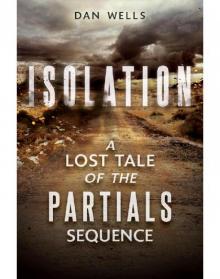 Isolation
Isolation I Don't Want to Kill You
I Don't Want to Kill You Ones and Zeroes
Ones and Zeroes Next of Kin
Next of Kin Over Your Dead Body
Over Your Dead Body Fragments
Fragments Mr. Monster
Mr. Monster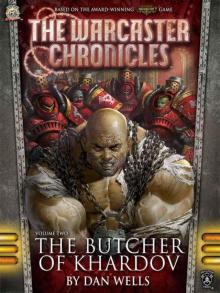 The Butcher of Khardov
The Butcher of Khardov I AM NO T A S E RI AL KI L L E R
I AM NO T A S E RI AL KI L L E R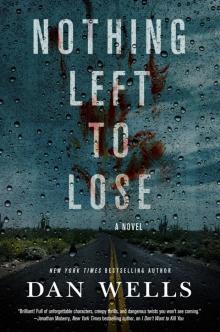 Nothing Left to Lose--A Novel
Nothing Left to Lose--A Novel Active Memory
Active Memory A Pear-Shaped Funeral
A Pear-Shaped Funeral I Am Not a Serial Killer
I Am Not a Serial Killer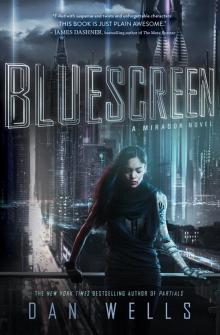 Bluescreen
Bluescreen Ruins
Ruins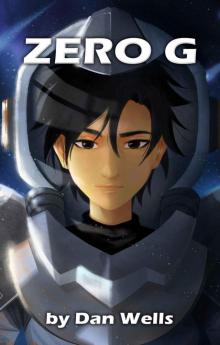 Zero G
Zero G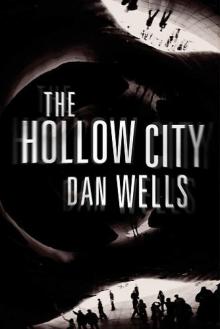 The Hollow City
The Hollow City Extreme Makeover
Extreme Makeover Partials p-1
Partials p-1 The Complete John Wayne Cleaver Series: I Am Not a Serial Killer, Mr. Monster, I Don't Want to Kill You, Devil's Only Friend, Over Your Dead Body, Nothing Left to Lose
The Complete John Wayne Cleaver Series: I Am Not a Serial Killer, Mr. Monster, I Don't Want to Kill You, Devil's Only Friend, Over Your Dead Body, Nothing Left to Lose